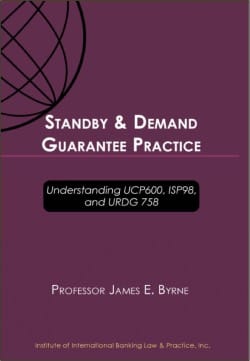Recently Decided Cases
DCW maintains a list of recently-decided court cases involving commercial letters of credit, standby LCs, demand guarantees, and other trade
Use of UCP600 for standbys continues, despite there being better suited rules in ISP98

Standby LCs mimic independent guarantees and were mainly issued by US banks predominantly during the time when issuance of guarantees seldom occurred in the US. Although US banks were never prohibited from issuing independent guarantees, in 1996 the US Office of the Comptroller of the Currency1 expressly permitted them to do so. Three years later, the OCC permitted US banks to issue dependent financial undertakings, although here to, they had been able to do so in connection with other banking transactions in which they were involved. ISP98 was promogulated by the Institute of International Banking Law & Practice, endorsed by the ICC (ICC Pub. 590), and US banks started issuing their standbys subject to ISP98. Banks in much of the rest of the world gradually did the same as knowledge of the rules grew. Prior to ISP98, despite its limitations, UCP was used extensively for issuance of standbys since it reinforced the independence and documentary character of letters of credit. But UCP was never intended to govern standby letter of credit practice.
UCP600 Article 1 (Application of UCP) states in part: “The Uniform Customs and Practice for Documentary Credits, 2007 Revision, ICC Publication No. 600 (“UCP”) are rules that apply to any documentary credit (“credit”) (including, to the extent to which they may be applicable, any standby letter of credit) when the text of the credit expressly indicates that it is subject to these rules.”
The word “any” implies that a standby of any form, i.e performance, advance payment, bid bond/tender bond, financial, etc, could be issued subject to UCP600.
The 2007 UCP revision made few changes relevant to standbys while carrying over the intent of UCP500.
In fact, even before UCP600, it was long established that the 21-day presentation period rule was not applicable to standbys. The ICC Banking Commission in its Opinion R168 (1987-1988) refused to apply the 21-day presentation period rule to a standby under UCP400: “The commission decided that under a standby credit Article 47(a) of UCP 400 does not apply, particularly where it is only a copy document which is, therefore, not a transport document.”
During the 2007 revision process, some previously issued ICC opinions, such as this one, were thought to merit incorporation in the UCP rules.

The three practice rules compared side by side - the ultimate drafting handbook.
Unlike ISP98, which was drafted for standby LCs and therefore caters to the myriad specific situations surrounding standby LCs, UCP only accommodates issuance of standby LCs. There are no provisions in UCP to cover situations like extend or pay, requests that the beneficiary issue its own undertaking to another (counter undertakings), and the like. It should be noted that the word “standby” appears only once in the text of the UCP600 rules.
Only a few UCP600 articles apply to standbys and some articles are inappropriate or otherwise incompatible with standby practice, tend to work contrary to the intentions of the parties, and, if applied, cause confusion in their interpretation and application. UCP600 Article 1 aptly uses the phrase “to the extent applicable …” to signal this.
Examples of UCP600 articles and topics that do not align with standby practice and tend to cause confusion include:
Gain full access to analysis, cases, eBooks and more with a DCW Free Trial